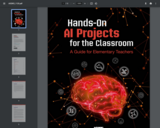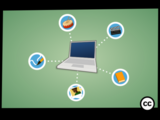6 Results

In this unit students will reflect on their own media environment, understand how cognitive bias and social media algorithms influence that environment, and learn how to investigate new sources and claims online. These activities culminate in a student-led "social science fair" MisinfoNight event where they present their new skills and knowledge to family members to help them become more savvy information consumers.
- Subject:
- Journalism
- English Language Arts
- Material Type:
- Lesson
- Unit of Study
- Author:
- Liz Crouse
- Shawn Lee
- Date Added:
- 07/29/2022
The information revolution of the 21st century is as significant and transformative as the industrial revolution of the 19th century. In this unit, students – and by proxy their families – will learn about the challenges of our current information landscape and how to navigate them. This unit is split into four modules. These modules can be done sequentially or stand on their own, depending on students’ needs and teachers’ timeframes. In this module (1 of 4), students analyze their own use of online social media platforms and learn how filter bubbles and confirmation bias shape the content of their media environment.
- Subject:
- Information Science
- Journalism
- English Language Arts
- Material Type:
- Module
- Unit of Study
- Author:
- Liz Crouse
- Shawn Lee
- Date Added:
- 03/08/2020

This guide provides student-driven projects that can directly teach subject area standards in tandem with foundational understandings of what AI is, how it works, and how it impacts society.
Instead of simply learning about AI through videos or lectures, the students completing these projects are active participants in their AI exploration. In the process, students work directly with innovative AI technologies, participate in “unplugged” activities that further their understanding of how AI technologies work, and create various authentic products—from presentations to designing an AI robot—to demonstrate their learning.
• Project 1: What AI Does Well and Does Not Do Well
• Project 2: Training Data and Machine Learning
• Project 3: Senses vs. Sensors
• Project 4: Navigation and AI
Visit the ISTE website with all the free practical guides for engaging students in AI creation: https://www.iste.org/areas-of-focus/AI-in-education
- Subject:
- Computer Science
- Educational Technology
- Material Type:
- Lesson
- Lesson Plan
- Module
- Unit of Study
- Author:
- General Motors
- International Society for Technology in Education (ISTE)
- Date Added:
- 07/14/2023


